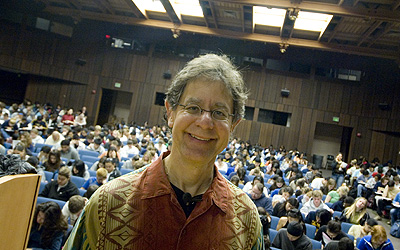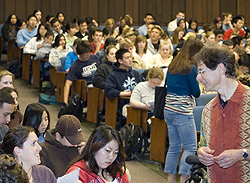UC Berkeley Web Feature
 |
David Presti in Wheeler Hall auditorium: "I've taught in all the big rooms on campus, and this is definitely my favorite." (BAP photos) |
A god among teachers: Students give neurobiology lecturer David Presti the 2006 Golden Apple Award for Outstanding Teaching
BERKELEY – "The coolest guy around." "A god." "Everyone loves him."
No, these undergraduates weren't referring to Oski, in response to a survey question asking them to describe their heroes at UC Berkeley. The "awesome" guy was David Presti, a senior lecturer of neurobiology in the molecular and cell biology department, who has just been named the 2006 winner of the Golden Apple Award for Outstanding Teaching.
"I know it's a super popular class
and everyone loves him, but there's a reason.
What I took from his class was more than
just the information inside, it was how to
think about things that he didn't even talk
about…I met with him after class a
few times and i have never had a professor
be so inviting and helpful. He is great." |
Now in its second year, the Golden Apple is sponsored by the ASUC, the Daily Cal, the Cal Student Store, and Berkeley Hillel. The only student-conferred teaching award on campus, it was created to honor those professors "who teach with energy — inspiring, demonstrating passion, and showing care in the classroom," says the ASUC website that solicited nominations from students.
Presti was chosen from a pool of 84 faculty members by an all-student committee. The selection process was somewhat subjective, admits committee co-chair Andrew Gurwitz. "I wish I could tell you there was a science to it, but there wasn't," he says. "We narrowed [the pool] down to five by looking for those professors who were nominated in the spirit of the award, for their teaching and lecturing — not their outside-the-classroom advice and help. And then we just considered which classes they taught and how involved they were."
Presti did have a slight advantage: He teaches more undergraduates than any other professor on campus, according to Gurwitz. There are 646 students enrolled in his "Brain, Mind, and Behavior" (MCB 61) lecture class, and another 174 in "Molecular Neurobiology and Neurochemistry" (MCB 165). Each semester he is also the adviser for a large MCB DeCal class and in the fall semester teaches one of the College of Letters & Science's popular Discovery Courses.
Music for the masses
This morning (April 20) as they filed in, MCB 61's several hundred students were greeted by Sikh devotional music playing over Wheeler auditorium's sound system, courtesy of Presti's iPod. He always plays music at the beginning of class, but today's choice — from the Golden Temple in Amritsar, India — had a special purpose. They were taking an exam.
"Let the music help to relax you. Be confident and allow what you have learned to flow from your memory and guide your answers," he told the students as he walked up and down the aisles. Later, he explained, "It's part of my philosophy to make things fun for my students, including exams."
Asked what tricks he uses to keep students' attention in such a large, impersonal environment, Presti claims not to have any. "Truly, I am so honored by this award, but I don't know what I do differently," he says modestly. "I just try to do what I do with enthusiasm, which is not hard because I'm really interested in neurobiology, and I'm interested in communicating how interesting it is. I think students have an extraordinary opportunity being here at the university, and I feel grateful and honored to have a role in sharing knowledge."
Presti began teaching part-time at Berkeley in 1991, continuing to work as a clinical psychologist at the Veteran's Administration Medical Center in San Francisco. He left the VA in 2000 to teach full time, and to do research on how chemical processes in the brain manifest themselves in behavior. He has studied how meditation alters the perceptual behavior of Tibetan monks, as well as the effects that psychoactive drugs like psilocybin and dimethyltryptamine have on the chemistry of the brain.
His work has taught him — and he hopes to convey in turn to students — that "the brain is very complicated, and at some level, everything influences everything else," he says. "The neural circuitry of the brain is malleable and undergoes constant change. Practice and repetition wire in new circuits." In essence, Thomas Edison's recipe for success — 1 percent inspiration and 99 percent perspiration — has some neurological backing.
To teach his own
Presti will give a special Golden Apple lecture on May 4 at 6:30 p.m. in 2050 Valley Life Sciences Building. The prize committee chose the subject, "An Ideal Last Lecture," for two reasons. The Golden Apple Award recognizes those faculty "who consistently teach each lecture as if it were their last." The topic is also inspired by a Talmudic dictum from turn-of-the-20th-century Jewish scholar Eliezer ben Hurkanos, who taught, "Get your life in order one day before you die."
Having just learned of the award, Presti has no idea what he will lecture on. "I don't even know how long it's supposed to be," he chuckles, before saying he will probably talk about how the educational process interfaces with brain science: how important it is to understand how the brain learns.
Judging by the number of grateful students, Presti has clearly figured out a few things about reaching minds — and hearts — already.


